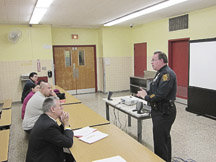For the North Bergen parent of a 13-year-old who attends a local elementary school, the school district’s informational event on Wednesday for parents about bullying was very important.
“She uses all the websites, all the Myspace, Facebook,” said the parent. “She actually has been a bully, and I’m working really hard on that.”
This parent and most of the approximately 50 parents (as well as a few students) in attendance in the high school cafeteria were there to get advice on how they might monitor and control their children’s online lives, which span the use of social networking, online gaming, the mobile web, and texting.
According to John Belluardo, the coordinator of the yearly Violence Awareness seminar held under the North Bergen Board of Education’s Student Assistance Recourse Program, this year’s topic was on cyberbullying, due to the recent death of Rutgers University student Tyler Clementi, but also because the internet can create problems within their own homes and schools.
“Our kids are in communication with these people through the internet.” – Joseph Sitty
________
North Bergen Police Officer Joseph Sitty Jr., who heads the district’s Drug Abuse Resistance Education (D.A.R.E.) program, spoke to parents about the social networking sites that teens, and even younger children, are using. A D.A.R.E. video was played for parents.
Sitty also spoke about “sexting” and how a juvenile with “pornographic” images on their phones could get charged with child pornography, even if they are a child themselves.
He told parents that the problem was very real, and said that recently police had to search for juvenile female who had ran away from home to meet up with someone she met on the internet.
“We had to have two officers go over to New York City to pick this lady up because she met somebody online today, so our kids are doing this,” said Sitty. “Our kids are in communication with these people through the internet.”
Sitty said that while most social networking sites have age limits, a tech-savvy kid can bypass this feature.
Web for kids
Most of Sitty’s talk dealt with websites that parents might not even recognize as social networking sites, like Webkinz, an online world that children can enter just by purchasing a stuffed animal with a special internet code at “any drug store across the county, something that an internet predator could do as well,” he said. Others, like Club Penguin, Wee World, and Zwinky also allow children as young as ages five through six to talk with one another, or someone posing as a child.
Most of his experience has been gained through monitoring his own 11-year-old daughter, he said. He had installed tracking software, which takes screen shots every few seconds, onto his computer years ago due to his fear that his daughter could communicate with strangers.
Sitty also told them about software to track their child’s cell phone use.
After catching his daughter in prohibited behavior once years ago, she was grounded for a week. He explained to parents, through his own experiences, that moderating the internet was difficult, since the first response as a parent is to take it away from kids. Sitty said that when he asks students who have experienced either cyberbullying or something inappropriate on the web, nine out of 10 do not report the incident to their parents because they do not want to lose their internet privileges.
Amparo Caicedo and Angel Chevas, the parents of a six-year-old son, believed that installing software to monitor their son’s internet whereabouts would be a good resource. Chevas said that maybe they didn’t have much to worry about now, but in three years, these websites would be “more inviting.”
“As parents, we want to build a shield to protect them; at the same time, we’re not 100 percent thinking about that,” Chevas said. “Whatever situations we have, losing a job, or rent, or a mortgage, bills, the social life around us, and so and so and so, so we don’t really get into those details, and that’s the point that we have to target. At the same time, it’s our mistake, its human.”
Giving parents resources
Sitty also told parents that if a child ever receives a violent or inappropriate message online to not close the screen, but to just pull the plug out of the wall, before calling the police department, which can then recover the information and find out who the perpetrator is.
He also told them that students can contact any of the D.A.R.E. officers at schools.
“I want to thank you; this is the best turnout that we’ve had, and we do this every year,” said Mayor and Assistant Superintendent Nicholas Sacco, who said that cyberbullying could be “dangerous and deadly.”
Belluardo and Sitty also compiled more than 50 pages of internet abbreviations.
“I’ve seen [my daughter] use codes,” a parent, who said it was like a dictionary. “I ask her ‘what does this mean,’ [and] most of the time she tells me.”
Tricia Tirella may be reached at TriciaT@hudsonreporter.com.
